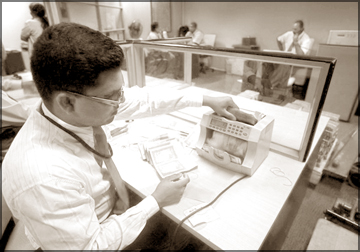|
Sri Lanka Rupee:
Fluctuating fortunes
A Staff Economist
Globally, currency prices or exchange rates have been highly volatile
in the recent past as a result of various factors connected with the
current global financial crisis that started to emerge from August 2007.
Such volatilities are common phenomenon in the currency markets from
time to time.
Uncertainity
|

Rupee started to depreciate due to global financial crisis |
Although there are many theories and research on determination of
exchange rates, their volatile behaviours and necessary policy measures
for maintaining their stability at desirable levels, no economist is
able to tell the exchange rate of a currency in the foreseeable future.
According to views expressed by some economists in the recent past, the
exchange rate between the Rupee and US Dollar ($) would have now reached
the levels of depreciation seen in Zimbabwe. Meanwhile, currencies of
some countries, e.g., Korean Won, have depreciated recently as much as
50 percent. US$ has been volatile against many currencies in various
directions and magnitudes, despite the efforts of the world to maintain
its stability.
Factors
Although various economic fundamentals can be used to explain the
behaviours of exchange rates during a reasonably long period of the past
(e.g., five to 10 years), the aggregate speculative behaviour of market
participants, i.e., foreign exchange dealers, exporters, importers,
investors and policymakers based on various factors or shocks is the key
drive of the exchange rate volatility during the shorter periods, beyond
the demand and supply conditions of currencies for underlying real
transactions.
For example, in the inter-bank market, the Rupee has been
depreciating in 2007 from Rs. 108 a dollar in January to Rs.113 a dollar
by mid October. However, originating from foreign exchange proceeds on
the international bond issue and partial opening of Government
securities market to foreign investors, the Rupee tended to pass through
an appreciation drive back to Rs. 108 a dollar. Conversely, from the mid
October 2008, the Rupee started to depreciate reaching Rs. 116 a dollar
by third week of April 2009, mainly on account of factors connected with
global financial crisis. One can observe that within those
directions/trends, there have been very short-term volatilities as well
as stability too.
The volatility is the source of exchange risk that would create
losses to various parties whose speculative powers and arrangements are
poor.
Information
Therefore, market participants must gather sufficient amount of
information and manage the speculation prudently, rather than blaming
the policymakers for not maintaining the exchange rate to accrue
profit/benefits to them.
In Sri Lanka, current inter-bank exchange rate is around Rs. 116 a
dollar. However, the policymakers’ action to improve foreign reserve
position through currency swaps with foreign countries/central banks and
prospective borrowing from the IMF and the loan from Libya would cause
market speculation towards appreciation of the Rupee in the foreseeable
future. In addition, huge amount of money printing and Government
stimulus packages in the US may add a significant amount of dollar
liquidity in the international market causing a depreciation of the
dollar. Although Sri Lanka’s current account deficit on international
transactions involving trade of goods, services and remittances may
continue to grow requiring the Rupee to depreciate as predicted in
certain economic views, the speculative behaviour of the market
participants will decide the future exchange rate movements.
Speculation
Accordingly, along with the policymakers’ motive to maintain a
greater exchange rate stability (globally too), the specific
circumstances prevailing in Sri Lanka may likely to cause speculation on
the Rupee to appreciate in the near future and markets participants may
plan their transactions appropriately. |



